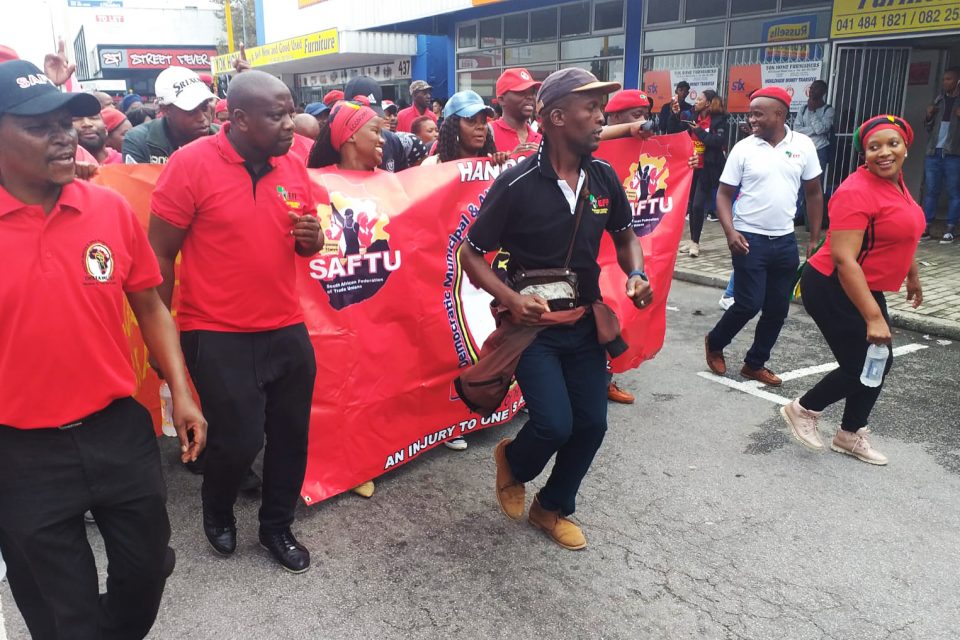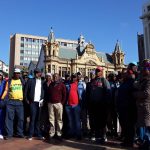Saftu’s municipal union scores against government
When the labour registrar deregistered Demawusa, it faced ruin. Now the Labour Court has suspended the ruling pending an appeal.
Author:
13 March 2020

The Labour Court has suspended the deregistration of the Democratic Municipal and Allied Workers Union of South Africa (Demawusa) pending the union’s appeal against its deregistration.
Labour Court judge Robert Lagrange’s ruling on 10 March 2020 was a victory for Demawusa, an affiliate of the South African Federation of Trade Unions (Saftu). The workers’ union would not have been able to represent its 12 000 members for several months if it remained deregistered while it waited for a date to appeal the ruling.
On 30 January, the deputy registrar of labour relations, Mary Mongwadi Ngwetjana, deregistered Demawusa for allegedly failing to prove that it had held a secret ballot of Metrobus workers in Johannesburg before they embarked on a strike in September 2019.
Related article:
New guidelines making it compulsory for unions to hold a secret ballot before striking were introduced in an amendment to the Labour Relations Act in December 2018. The guidelines are a departure from the traditions of the trade union movement in South Africa. Historically, major strike decisions have been made by a show of hands at general meetings attended by hundreds or sometimes thousands of workers.
These meetings are held before wage negotiations begin or once the negotiations deadlock. Holding a written secret ballot is very time consuming. Usually, meetings are used for workers to debate the kind of increase and improvement to working conditions they want and to give leaders a clear mandate for the negotiations before voting by a show of hands.
According to Saftu general secretary Zwelinzima Vavi, a show of hands is much more democratic than “the cumbersome and bureaucratic balloting envisaged by the state, which gives space for outside anti-union interference”.
“Workers never take the decision to strike lightly. It involves serious sacrifices, including the threat of unemployment and increasingly, the blatant victimisation of comrades who are prepared to stand and fight for their members,” said Vavi.
Related article:
Saftu was formed in 2017 as a rival federation to the ANC-allied Congress of South African Trade Unions (Cosatu). Cosatu’s former largest union, the National Union of Metalworkers of South Africa (Numsa), is a part of the new federation. Demawusa also broke away from Cosatu.
Former staff members and shop stewards of the Cosatu-affiliated South African Municipal Workers Union (Samwu) formed Demawusa in 2016. Samwu was once a leftist union. It spearheaded the campaign against the privatisation of water in the 1990s. But in 2014, new leadership took power and purged its leftist staff and shop stewards. They shut down its Cape Town head office, retrenched most head office staff members and centralised power in Gauteng.
Undermining union power
The new leadership sold many of the union offices and, within a few years, were under investigation by the Hawks after allegations arose that they stole R178 million from the union’s bank account. Staff and shop stewards who called publicly for a forensic investigation into the theft were dismissed or expelled. They formed the “Save Our Samwu” coalition, before registering Demawusa as a rival union.
The registrar of labour relations is an appointee of Minister of Employment and Labour Thulas Nxesi, a former South African Democratic Teachers Union president. He is an ANC appointee. As the ANC and Cosatu are in a tripartite alliance with the South African Communist Party, Saftu believes the registrar is “irredeemably partisan” towards ANC-aligned unions.
“The insistence of the ANC government on balloting before strike action has little to do with advancing union democracy,” said Vavi. “It is actually designed to undermine union power, by allowing anti-union media and other conservative forces to try and dissuade workers from taking action and to create division in our ranks.”
Related article:
Demawusa’s deregistration came after the union’s members at Metrobus in Johannesburg held what they believed to be a protected strike from 16 to 23 September 2019. The strike was called off after Metrobus was granted an interdict against Demawusa. Shortly after the strike began, the registrar asked for proof that the union had conducted a secret ballot but, said Vavi, did not specify what proof was wanted.
Demawusa says it did hold a secret ballot on 4 September 2019 and that staff changes in the head office meant that there was an “administrative vacuum” in the union and that it did not receive further correspondence from the registrar on time.
In his judgement, Lagrange said it was “a somewhat drastic step” for the registrar to deregister a union because of “an alleged failure to comply with balloting provisions on one occasion” and because the union hadn’t provided other information the registrar had requested.
He noted that the previous judgements had recognised that when a union was deregistered, it had a “profound impact” on its ability to represent members in disputes, and that at the time Demawusa was deregistered, many of its members were temporary employees for whom the union was negotiating permanent positions.
He also noted that the registrar had previously deregistered unions that had been accused of large-scale corruption in the form of theft of members’ subscription fees, and this was after the unions’ own members appealed for the deregistration. This case was completely different – the registrar had received no complaints about Demawusa from its members.
Allegations of victimisation
Vavi has also accused the registrar of targeting Saftu unions and not asking Cosatu unions for proof of secret ballots before strike action. Lagrange touched on this point in his judgement, saying, “Counsel for the registrar could not say if such an inquiry is now standard practice for the registrar.”
Lagrange awarded costs against the registrar’s office.
Meanwhile, in Nelson Mandela Bay, Demawusa members celebrated the suspension of the union’s deregistration by marching against the municipality the day after the judgment. Demawusa provincial coordinator Siphiwo Ndunyana told New Frame that the union was protesting against the council’s decision to outsource all the municipal workers who had previously been insourced. It was an action that Demawusa would have had no standing to organise had the Labour Court not suspended its deregistration.
The registrar and Demawusa will face off again when Demawusa appeals against the registrar’s decision.



